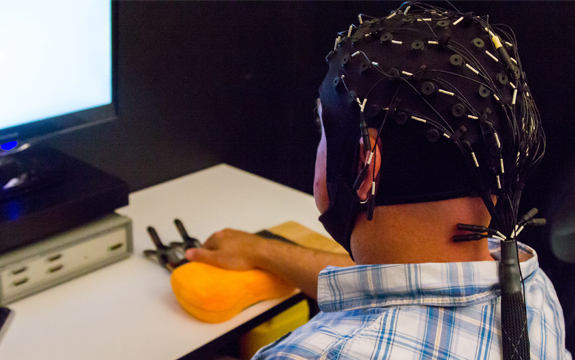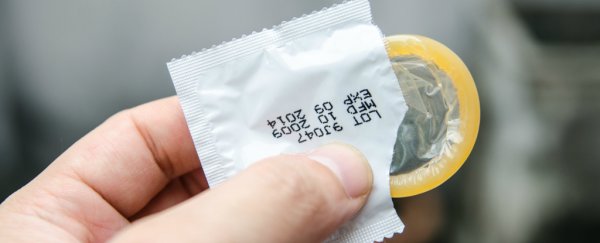It's no secret that condoms are a hard sell when it comes to the pleasure factor, but scientists in Australia are now working to create condoms that feel just as good (if not better) than wearing nothing at all. To figure this out, they're monitoring people's neurological response to different materials to see whether they can really trick the brain into thinking a condom feels like skin.
Despite being such a frequently used item, condom design hasn't really changed over the past century, and young people today report being less and less inclined to use them. But scientists from Swinburne University of Technology are hoping to change that by making condoms out of a new material known as hydrogel that feels just like human skin.
What's amazing about hydrogel is that it doesn't just feel good, it also has some pretty incredible properties. For example, scientists can lace it with medications or chemicals that could help fight sexually transmitted infections. It's also thinner and stronger than latex.
"Hydrogels are mostly made of water, held together by molecular chains called polymers," said one of the researchers, Bridgette Engeler Newbury. "They have properties very close to human tissue, and can be tailored to feel a lot like skin."
But before building the condom of the future, the Swinburne researchers are working with the University of Wollongong to make sure the formula of hydrogel they're using is the best one – pleasure-wise.
Of course, they could do that by simply asking people which materials they prefer the feel of. But the team wanted to find out if they can actually trick people into thinking they're touching skin, rather than a hydrogel. So they're using EEG scanners to see how a person's brain responds when they touch different materials. And to be clear, they're only touching the materials with their hands in this research.
 Swinburne University of Technology
Swinburne University of Technology
"Measuring changes in brain activity is an effective way of determining whether or not the hydrogel is more preferable than existing condoms," said Joseph Ciorciari, who is leading the brain scan study.
The research has already revealed that people respond favourably to hydrogel over latex, but the team is now expanding the study to get a better idea of what their volunteers do and don't like in a material.
"The EEG allows us to measure the brain's subconscious responses to the material, before the participant has even had the chance to decide whether or not they are going to respond positively to it," said Ciorciari. "This removes any bias or pre-existing influences from the equation."
Swinburne University of Technology is a sponsor of ScienceAlert. Find out more about their innovative research.
